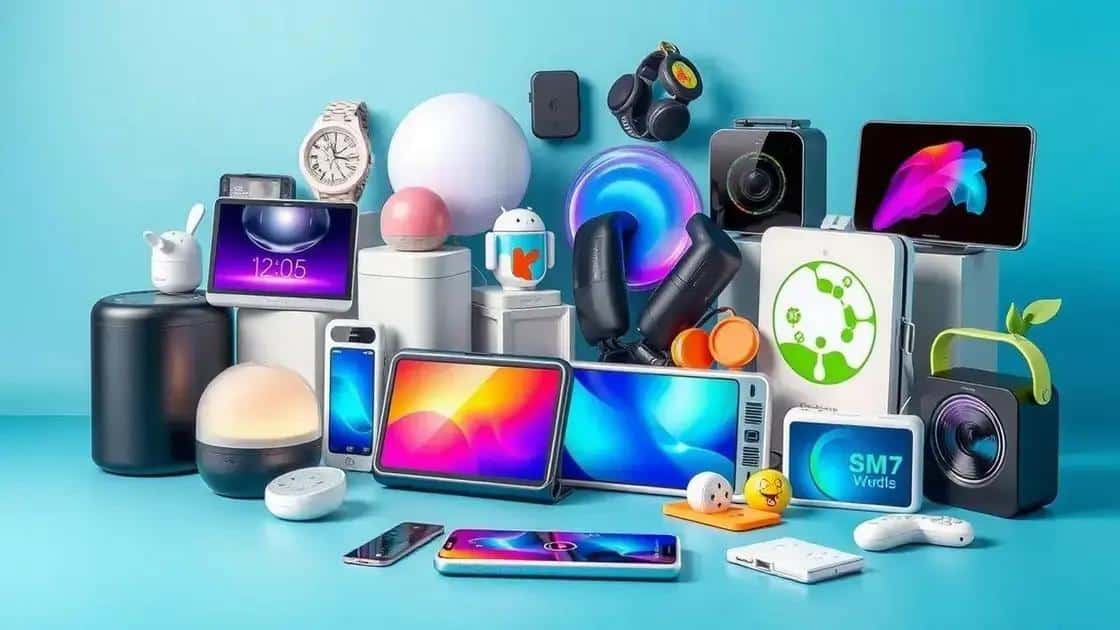Insights on consumer tech releases 2025: what’s coming up?

The shift in consumer behavior with new technology drives increased online shopping, demands personalization, and emphasizes the influence of social media and smart technologies on purchasing decisions.
Insights on consumer tech releases 2025 are crucial for anyone eager to stay ahead in the tech world. Ever wondered how the latest gadgets will change your daily life? Let’s dive into what to expect!
Key upcoming technologies to watch
As technology continues to evolve rapidly, knowing the key upcoming technologies can empower consumers and businesses alike. The landscape is ever-changing, bringing exciting developments that shape our future.
Artificial Intelligence Advancements
Artificial Intelligence (AI) is evolving at a blistering pace. Innovations aimed at enhancing user experience are pivotal. Companies are integrating AI into everyday devices, making them smarter and more intuitive.
- Improved machine learning algorithms
- AI in healthcare for diagnostics
- AI-driven customer service solutions
- Smart home devices leveraging AI
The use of AI will not just automate tasks but also offer personalized experiences, revolutionizing how we interact with technology.
5G Technology and Connectivity
Another transformative shift on the horizon is the widespread rollout of 5G networks. This technology promises to enhance mobile data speeds dramatically.
- Faster internet connections
- Lower latency for real-time applications
- Better connectivity for IoT devices
- New opportunities for remote work and telemedicine
The capacity of 5G will foster innovations in many sectors, enabling a wave of new applications and services.
Augmented Reality (AR) and Virtual Reality (VR)
AR and VR technologies are becoming more mainstream, blurring the lines between digital and physical worlds. They offer immersive experiences that are changing industries like gaming, education, and training.
Imagine using AR to visualize furniture in your home before buying it or leveraging VR for realistic simulations in medical training. The possibilities are endless, creating engaging experiences that were once only envisioned in science fiction.
Blockchain Beyond Cryptocurrency
Finally, blockchain technology is poised to disrupt many industries beyond just finance. Its ability to provide secure and transparent transactions opens doors to new applications.
From supply chain management to digital identity verification, the impact of blockchain can enhance security and efficiency across various sectors. As more companies adopt this technology, it will reshape how we think about trust and transactions in the digital age.
In conclusion, staying informed about these key upcoming technologies is essential. With AI, 5G, AR/VR, and blockchain leading the charge, the future looks bright. Embracing these technologies now can give consumers and businesses a significant edge in the evolving digital landscape.
Trends in consumer electronics for 2025

Consumer electronics are evolving rapidly, and understanding the trends in consumer electronics for 2025 is essential for staying ahead. Innovations are shaping how we live, work, and connect with technology.
Smart Home Technology
Smart home devices are becoming more integrated and sophisticated. Future trends show that these devices will not only connect to each other but also learn from user behavior.
- Voice-activated assistants controlling multiple devices
- Enhanced home security systems using AI
- Energy-efficient appliances with smart usage tracking
- Interconnected systems for seamless home automation
As technology improves, the emphasis on user-friendly interfaces and enhanced security will drive new innovations in smart homes.
Wearable Technology
Wearable devices are expected to gain more features and capabilities. The focus will be on health monitoring and connectivity.
- Fitness trackers with advanced health metrics
- Smartwatches integrating AI for personalized experiences
- Health-focused devices with telemedicine capabilities
- Augmented reality glasses enhancing daily tasks
The future of wearables looks bright, with increased focus on health and wellness becoming central to design and functionality.
Portable Tech Innovations
As technology becomes more portable, the demand for lightweight, powerful gadgets is growing. Tablets and laptops will evolve, becoming more efficient and versatile.
Imagine devices that seamlessly transition from work to entertainment while maintaining high performance. This shift will transform how we engage with technology throughout the day, making it more accessible and flexible.
Eco-Friendly Electronics
Sustainability is a major trend driving consumer electronics. Companies are focusing on creating eco-friendly products.
- Devices made from recycled materials
- Energy-efficient products to reduce carbon footprints
- Programs for recycling older electronics
- Designing for longevity and upgradeability
Incorporating sustainability into product design not only meets consumer demand but also aligns with global efforts to protect the environment. Green technology is likely to influence purchasing decisions significantly.
Impact of AI on future devices
The impact of AI on future devices is profound and far-reaching. As AI technology advances, it will redefine how we interact with our gadgets and appliances.
Enhanced User Experience
One of the most significant changes is the enhanced user experience that AI will bring. Devices will learn from user behavior, providing recommendations and automating routine tasks.
- Smart assistants that can handle complex queries
- Personalized content based on preferences
- Adaptive interfaces that change according to user habits
- Devices that streamline daily tasks seamlessly
This shift will create a more intuitive interaction between users and their devices, making technology feel like a natural extension of ourselves.
Improved Efficiency
AI will also lead to improved efficiency in devices. Machine learning algorithms can optimize how devices operate, reducing energy consumption and increasing functionality.
For example, lighting systems that adjust based on occupancy and energy usage can lead to significant savings, while appliances can self-diagnose issues before they become problems. This predictive approach not only enhances convenience but also extends the lifespan of devices.
Revolutionizing Industries
The integration of AI into consumer devices will revolutionize various industries. From healthcare to entertainment, the possibilities are endless. Healthcare devices that utilize AI can offer real-time health monitoring and alert users about critical conditions.
In the entertainment sector, smart TVs and streaming devices will provide personalized recommendations based on viewing habits, enhancing user satisfaction. This transformative approach will lead to devices that are not just tools but key partners in our daily lives.
Privacy and Security Concerns
While AI brings numerous benefits, it also raises concerns about privacy and security. As devices become more intelligent, the data they collect can pose risks if not managed correctly.
- Increased data collection by smart devices
- Concerns about breaches and data misuse
- The need for robust security protocols
- Transparency in how data is used and shared
Addressing these challenges is essential for ensuring that consumers feel safe and secure as they embrace AI-driven technology in their lives. Ultimately, the impact of AI on future devices will shape a more connected and intelligent world.
Consumer behavior shifts with new tech

The landscape of consumer behavior is constantly evolving, especially with the introduction of new technology. Consumer behavior shifts with new tech highlight how advancements influence purchasing decisions and interactions with products.
Increased Online Shopping
One of the most significant changes is the rise of online shopping. With smartphones and improved internet access, consumers are shopping more than ever from the comfort of their homes.
- Convenience of shopping anytime, anywhere
- Access to a wider range of products
- Ability to compare prices effortlessly
- Enhanced delivery options including same-day delivery
As a result, businesses must adapt to this trend to capture the online market.
Personalization of Products
New technology enables brands to offer personalized experiences to consumers. Data analytics plays a crucial role in understanding what customers want.
This leads to tailored recommendations, resulting in more satisfying shopping experiences. Customers appreciate brands that recognize their preferences and adapt accordingly. Whether through targeted ads or customized product suggestions, personalization enhances customer loyalty.
The Role of Social Media
Social media platforms significantly influence consumer behavior today. These platforms are not just for social interaction; they are powerful tools for marketing.
- Influencer marketing driving brand awareness
- Real-time feedback and interactions with brands
- Visual content attracting potential buyers
- Opportunities for user-generated content to foster trust
Consumers often rely on social proof from peers and influencers, making social media a key player in shaping purchasing decisions.
Adoption of Smart Technologies
Smart technologies, such as AI-driven chatbots and virtual assistants, are changing how consumers interact with brands. Customers expect rapid responses and services tailored to their needs.
This demand for instant gratification pushes companies to innovate and ensure customer satisfaction. Smart devices are also making shopping more interactive, offering features that engage users throughout the purchasing journey.
Overall, as technological advancements continue, the shifts in consumer behavior are pivotal for businesses to understand. Companies must be flexible and innovative to meet the changing demands of today’s tech-savvy consumers.
In conclusion, understanding the shifts in consumer behavior with new technology is crucial for businesses today. As technology continues to advance, consumers expect more convenience, personalization, and efficient interactions. Companies must adapt to these changes to thrive in a competitive market. By embracing innovative solutions and leveraging data, brands can meet customer demands and build lasting relationships. The future of consumer tech promises exciting developments that will further change how we shop and connect.
FAQ – Frequently Asked Questions about Consumer Behavior Shifts with New Tech
How has online shopping changed consumer behavior?
Online shopping provides convenience, allowing consumers to shop anytime, anywhere, which has led to an increase in e-commerce popularity.
Why is personalization important for consumers?
Personalization enhances the shopping experience by tailoring recommendations to individual preferences, fostering customer loyalty.
What role does social media play in shopping decisions?
Social media influences consumers by providing social proof and recommendations through peer reviews and influencer endorsements.
How do smart technologies improve customer interaction?
Smart technologies, like AI chatbots, provide instant responses and personalized engagement, enhancing the overall customer experience.






